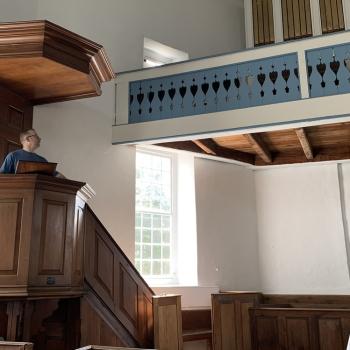Now Featured in the Patheos Book Club
Raising the Perfectly Imperfect Child
Facing the Challenges with Strength, Courage, and Hope
By Boris Vujicic
Before your son Nick was born, did you have any indication that he might have some physical disabilities?
We had no indication at all. All examinations and reports showed he was typical. Dushka, most likely due to her midwifery profession, did raise some questions with the obstetrician saying that she felt the baby was sitting a bit too low and she wondered if the size was right. He checked her and reassured her that all seemed normal, and there was nothing to worry about. For the same reason as time drew closer to her due date, she often said to me: "I hope the baby's OK." Obviously, I had no reason to think otherwise and just reassured her that, of course, all would be well with the baby.
How did you and your wife respond when you discovered that he had no arms or legs?
We were in total disbelief and shock. We felt like it was a bad dream. We were asking God why. Why would He give us a limbless child? We didn't feel He was fair to us. We were in tears, crying for not having a healthy baby as we expected and, at the same time, anxious as to what kind of life could this child expect. Also, we asked: How can we raise such a child to the point where he will have a fulfilling life?
When Nick was first born, what were your fears for him?
Our worst fears were that he'd never be able to sit up, walk and help himself. He'd be always dependent on others' mercy, compassion and help. He'd never be able to live a ‘normal' life – be self supporting and happy. I was afraid he'd be lying in his bed for the rest of his life. I couldn't imagine a limbless child being self sufficient, independent and having his own family and most of all—being happy.
How did you take care of him the first few weeks? Were you still in a state of shock?
He spent those weeks in hospital and initially was taken care of by the nursing staff. It was a couple of days before I came to terms with his disabilities and was able to hold him. However, both my wife and I felt inept and unqualified to care for him because we were still in shock at his unexpected condition. We were overwhelmed with anxiety and fear over not being able to provide the care he'd need both physically and emotionally. These feelings prevented us from bonding, as normally is the case with the birth of a child. We were not overjoyed with his birth. Rather, we were in agony, shock and grieving.
Did you question God at this time?
Absolutely! I sought answers, but they didn't seem to come our way. We sought God's purpose in bringing our limbless child into this world. Was there a plan or was this a mistake? What were we expected to do and how? Why couldn't we have had a normal child like everybody else?
Did you or your wife blame yourself for Nick's physical limitations?
I searched deep within for the sin that might have caused this defect especially when someone suggested that as being the cause. I later became aware that my wife also felt somewhat responsible though she had done everything right and took good care and precautions during pregnancy—abstinence from medication, drugs, alcohol, etc. We questioned genetics too, but there was simply no answer.
Did you find out about anyone else who also didn't have any limbs?
We met no one who was very similar to Nick until much later in his life. As an adult, he has met around 25 people around the world whose bodies resemble his. Back in his childhood, we learned of a couple who each had partial limbs and were older so not as close to Nick's situation as we would have liked. Nevertheless, it was good to have an idea about likely challenges Nick and us as parents may be facing. Mostly, it helped us see the relationship and the bond between parents and their disabled child. It was encouraging to us and helped cement our decision to take Nick home and raise him.
What were you told about his potential?
There was no specific or general view given by professionals about Nick's potential or success in life. There was no advice or comment made as to what kind of life Nick may lead or be able to lead. Most comments made were focused on his disabilities, limitations in leading a normal life and there was usually an emphasis on the need of strong parental support for the child. Financial resources were another issue. The limited government support and aid available to raise him seemed somewhat discouraging at first, and that is why putting him up for adoption was suggested. We only briefly considered this because it felt like an "easy way out" approach, but we felt much deeper moral and spiritual obligations as parents and individuals. Putting him up for adoption would have been a decision hard to live with for us even though we had concerns about his future potential and our ability to raise him up successfully.



